For three weeks, while a motley medley of angry mandate protesters and Covid conspiracy theorists camped illegally on Parliament’s front lawn – harassing locals and promising to execute MPs and the media – debates inside the House have largely refrained from giving them undue attention.
But now the protesters have gone, along with the agitators, the conspiracy theorists, and the violent thugs. And with them the mentally unwell, and the homeless and hungry that came for the free shelter, the sense of community or the free food.
So, on Thursday (while outside the forecourt was water-blasted and the lawn cleared by dump-sized graders), inside the House MPs put aside their usual business and spent some time ‘going there’.
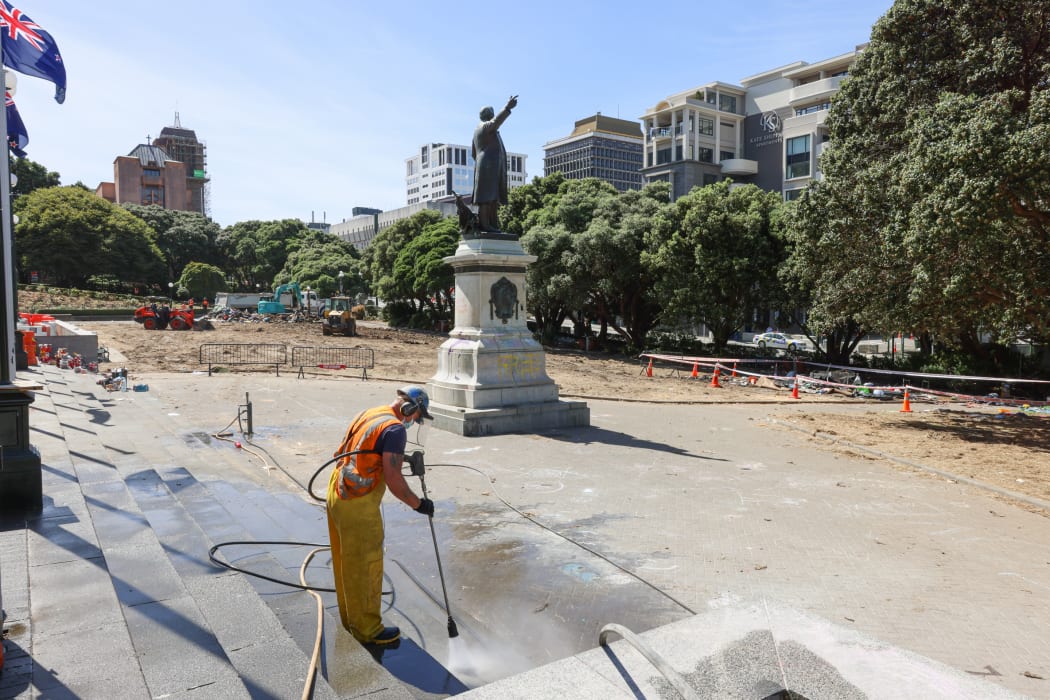
Parliament's forecourt is water blasted just a day after he police cleared the occupation. Photo: VNP / Phil Smith
Specifically, they discussed a motion offered by the Prime Minister Jacinda Ardern to pass on thanks to the various emergency services and staff who had returned Parliament to a sense of order. Those who had copped it on the front line while keeping and restoring order.
“Yesterday the police restored order on Parliament's grounds after an illegal occupation that lasted 23 days. As a result of that operation, 89 arrests were made, 40 police officers were injured, and 8 were admitted to hospital. In total, 600 police staff were involved in yesterday's events. There were 50 firefighters on site alongside Wellington Free Ambulance, who were treating those who were injured. And Parliament Security once again supported all those involved, and have stood alongside the New Zealand Police throughout the occupation.
"To each of you, we say thank you. You were there throughout these events at great risk to yourselves. Many of you were abused, some were injured, but you put your personal safety aside in order to look after others. And for that, we are very grateful. To Wellingtonians, I am sorry for what you have had to endure, but I thank you for your resilience. I hope your sense of safety and confidence has been restored. To [mana whenua], you have had to endure the trampling of your mana, and we will work with you to see that restored.”
The motion was agreed (with the addition of Māori Wardens), and it was well deserved. The police had shown steadfast bravery, amazing discipline and extraordinary restraint in the face of people using potentially lethal weapons against them and setting toxic fires in their wake as they retreated.
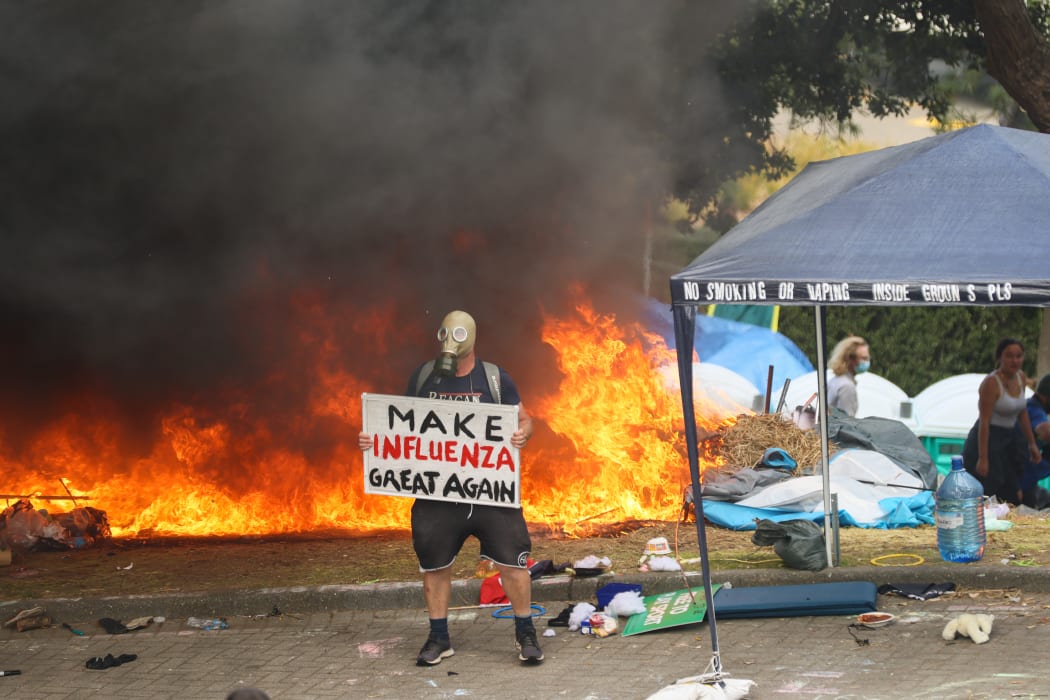
A protest stands in front a fire with a puzzling sign. Photo: VNP / Phil Smith
Each of the party leaders spoke and each of them thanked the various emergency services and Parliamentary staff.
But these are politicians and a motion of thanks is almost never just a motion of thanks, no matter how well deserved. It is also an opportunity.
The Prime Minister addressed the fear and reactive panic that arrived with the wildfire community outbreak, calling on people to stay the course.
“I saw a powerful message yesterday, shared by one of our health workers. It said that in all of the discussion about removing all of our current protections, they felt unseen. That with hundreds of hospitalisations and staff illness to contend with, the suggestion that we just give up and move on made them feel invisible. I know in this House none of us would wish any of our front-line workers to feel that way. They may not have occupied the front of Parliament, but they must occupy our thoughts.
“So my message today is simple. It is to condemn what happened here. Acts of violence cannot stand. It is to reinforce that this will always be a place where difference can be expressed and where that will be welcomed, but that should always be done with dignity and respect for the place upon which we stand. That everyone has sacrificed something in the last two years, but it has not been for nothing; it has been for each other. We just need to keep going a little longer.
“And finally, this too will pass. Where we are in the pandemic right now feels hard because it is, but things will change. Our people are coming home. Soon, tourists will return. Vaccine passes, mandates, restrictions — they will all change. There is reason to feel hopeful.
“But for now, the smell of smoke has faded. The playground will be restored. And the people, our people, will return to their place.”
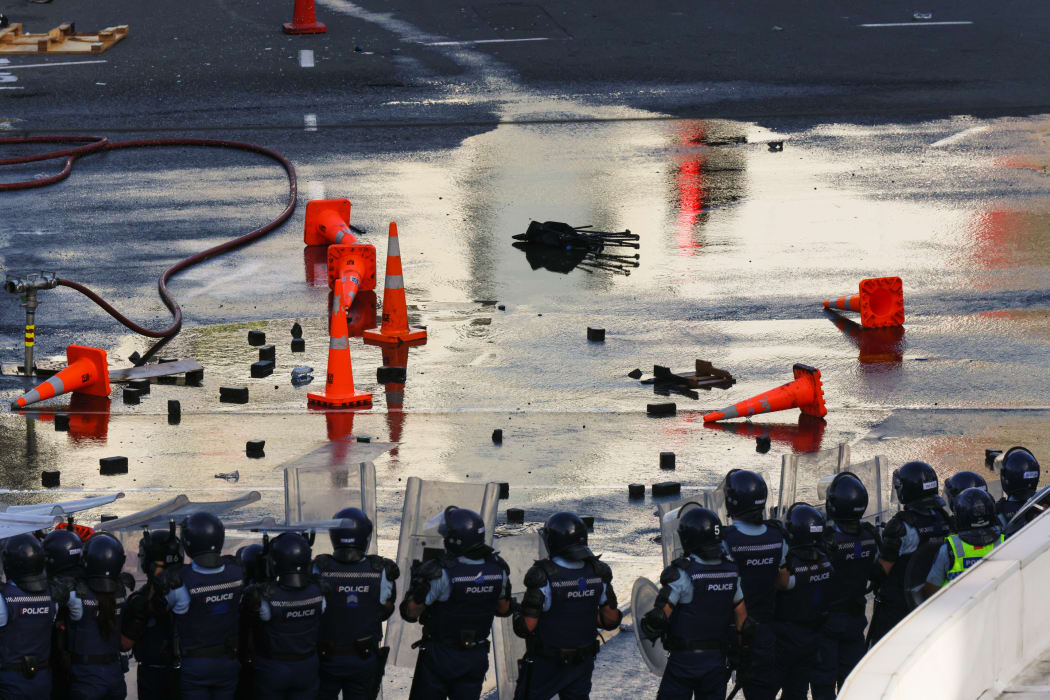
A retreated police line stands silhouetted against the corner of Lambton Quay and Bowen Street, littered with bricks and cones that have been thrown at them in an earlier position. Photo: VNP / Phil Smith
For National, Christopher Luxon also condemned the protesters, and thanked the police etc. Along with other MPs he noted that among the officers faced with flying bricks and chairs were 80 officers who had graduated just two days previously.
He then pivoted some to welcome a review of the protest and what could be learned from it.
“Now, while we recover from the hurt of yesterday's actions, it is still vital to examine how we got here in the first place. The National Party fully supports such a review taking place, and we commit to engaging constructively with it…”
“A review will undoubtedly find practical measures that can be implemented to enhance the security of this place. However, this Parliament is the heart of our democracy, and it must be open and accessible to New Zealanders. Cloistering and insulating this place and cutting politicians off from the people who elect us and send us here to represent them will only fuel more of the behaviour we've seen, not lessen it. The competing imperatives of safety and public accessibility must continue to be carefully balanced…”
“But we cannot risk writing off other New Zealanders' valid concerns because of the reprehensible behaviour of a disaffected minority. It is reasonable to expect that Aucklanders who spent 15 weeks in lockdown last year or business owners who have lost the ability to pay their staff or put food on their family's table will want to hold the government accountable for its decisions and promises. It is healthy for a democracy to allow a government to be questioned when its policies are creating significant disruption and impacts on citizens' lives.”
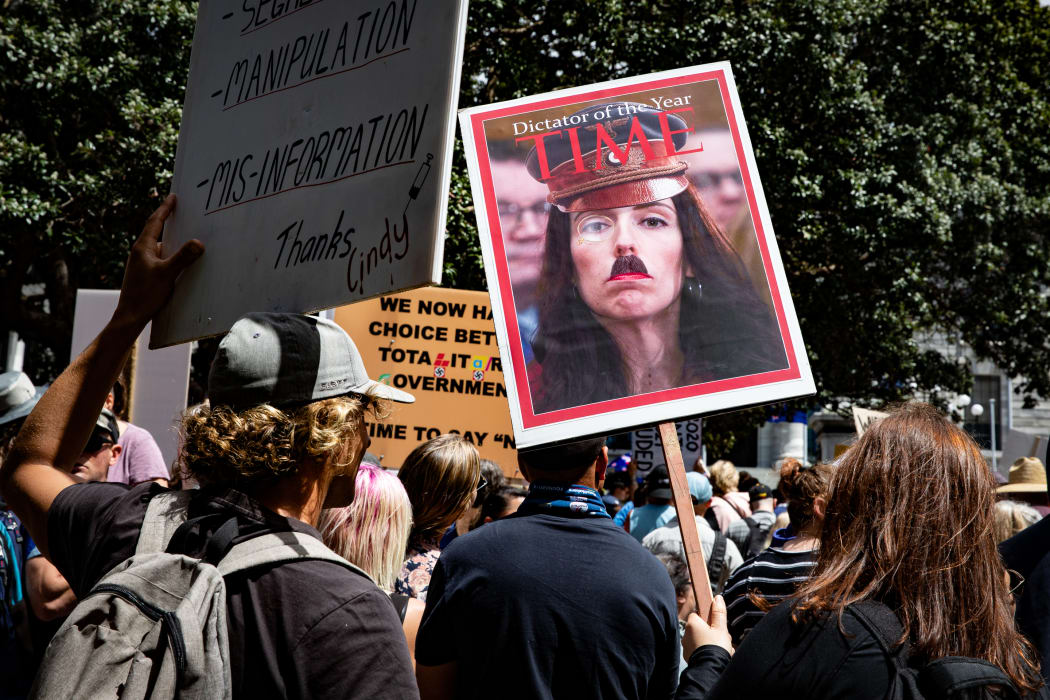
Bizarre conspiracy theories and personal attacks have been significant features of the more unhinged end of Covid-19 response. Many conspiracy theories have originated in far right groups and autocratic regimes. Photo: VNP / Phil Smith
For the Greens, James Shaw talked about the 'other virus' of far right, proto-facist and Russian mis- and disinformation that can be found at the bottom of many protesters' rabbit holes.
“Just shy of three years ago, I was stopped on my way to work by a man who yelled at me that I had to stop what I was doing at the UN — before fracturing my eye socket with his fist.”
That man had fallen down a conspiracy rabbit hole, just as many of the protesters had.
“The attack on the US Capitol on 6 January last year was fuelled by the misinformation and disinformation campaigns of far-right and proto-fascist movements aimed at destabilising and fracturing society and causing and creating the conditions for authoritarians like Trump and Vladimir Putin.
“The doubts about vaccines, mandates, and other elements of the public health response were seeded by the same actors. Those doubts actually manifested as public policy in a number of countries, leading to hundreds of thousands of more deaths than otherwise may have occurred. The protest on the Parliament lawn over the past few weeks was not an isolated event, nor was it new, and nor was it unique to us. But it did happen here, and those were New Zealanders out the front.”
Shaw also addressed the coming review, but he was more interested in addressing the cause, not just guarding against the symptoms.
“Now, there will undoubtedly be a range of inquiries into the protests over the coming months to see what could be done better when — or if — there is a next time. Could the police have intervened earlier or differently? Should Parliament have a wall around it? Is it ever OK to play Barry Manilow? But these questions are all about how we treat the symptoms. What I'm interested in is preventing the disease from overtaking us in the first place.”
He called for action against those who fanned the flames and then went home leaving others to do their dirty work.
“Yesterday, the grifters and the charlatans, the political opportunists, and the white supremacists who were behind the protest melted away like cowards and abandoned the field to the desperate people that they'd led astray. I can only hope that they will be held accountable for their part in all of this and that we can find a way, as a country, to immunise ourselves against their malign impact in the future.”
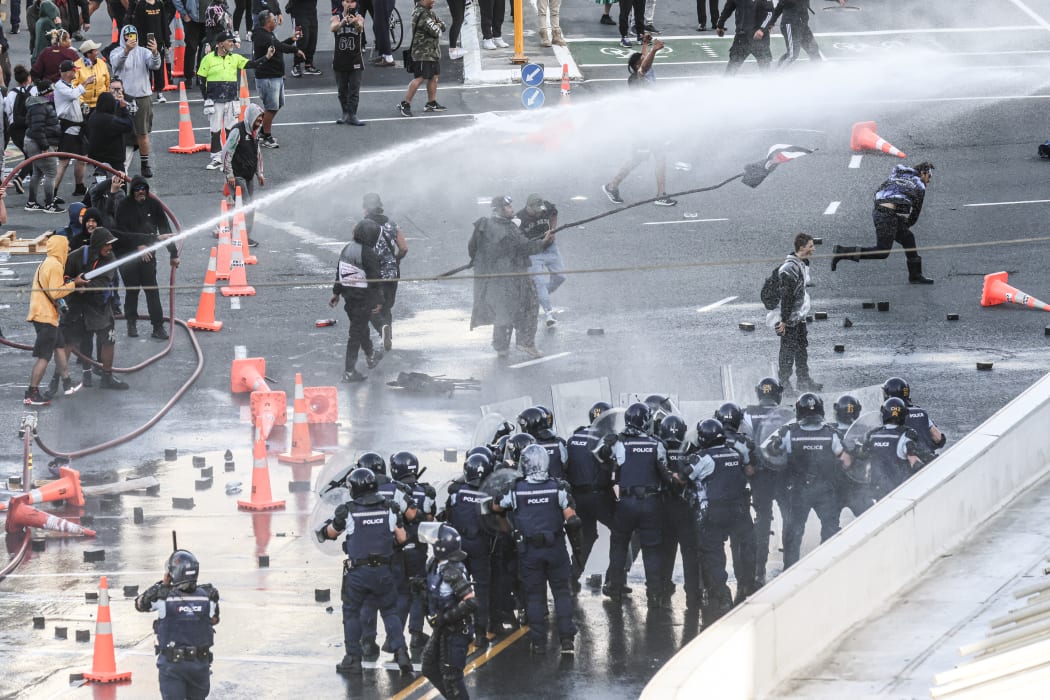
Protestors weld a fire-hose against police. Photo: VNP / Phil Smith
For ACT, David Seymour also began with thanks and stories of police bravery, then he too moved to consider causes. He saw the causes as being much closer to home however - across the chamber even. He talked of a school chaplain not given a vaccine exemption.
“The school's not allowed to make an exemption. He's not allowed to keep on teaching. That school has lost him at the time they most need him because of an inhuman and inflexible response to vaccination policy. What would have been more human is if we said it's vax or test. What would have been more human is if we said that an organisation can make its own rules. What would have been more human would have been to say that a doctor, as a respected professional, can keep their autonomy and make an exemption. For him, and many like him, that more human response would have been more in keeping with a government that was elected to talk about wellbeing, and, had we done that, we might not have created the seeds of this unacceptable and despicable meltdown that we have seen.”
Having intimated that the government’s policies had sowed the seeds of the thuggery, he said he thought blame and name calling was unhelpful. He had issue with the far right being implicated, saying all those protesting in opposition to policy were described by some as neo-Nazis.
“The people that are doing that are as much of a problem as some of the antisocial fringes of this protest…”
“It's no good calling people names. It's no good trying to toxify people. It's no good trying to blame people. What we need is dialogue and discussion about how we go forward, uniting New Zealanders behind good ideas rather than trying to demonise each other. That's what we need to do. Yes, we need to thank the police — and we should. Yes, we need to hold the criminals, who behaved so awfully yesterday, accountable. Yes, we need a response to Covid-19. But, you know, what we need more than anything is hope, healing, and humility — the ability to have dialogue, not to stereotype each other, or behave immaturely and call each other names. If we can unite behind good ideas then we can truly heal from this disgraceful day in our history.”
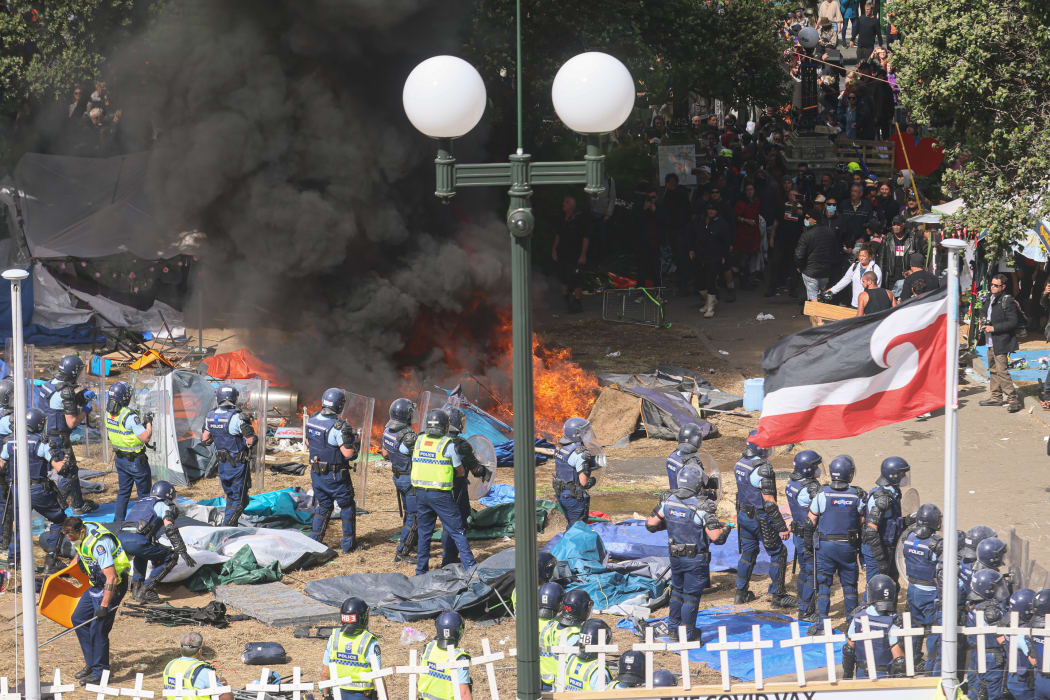
Both the Tino Rangatiratanga and the (united tribes) independence flag have been heavily used, arguably co-opted by anti-vaxx and anti-mandate protestors. Photo: VNP / Phil Smith
For the Maori Party, Rawiri Waititi saw roots in colonisation and its intergenerational traumas.
“What I saw yesterday on the grounds of Parliament was the manifestation of that colonial vision: the disconnection from our Māoritanga; the alienation from our whenua, our hapū, our maunga, our awa, and our language — our reo; the dysfunction with our communities; the intergenerational trauma; the years of never being heard. The whakapapa of this can only be traced back to colonisation. Colonisation has turned our worlds upside down and has rendered parts of the culture unrecognisable. It continues to divide us today because it feasts on our trauma, thus forcing us to disregard the very essence of who we are and who we once were.”
He noted that when Covid-19 has passed Māori will still face widespread inequities in health, education and many social outcomes.
But he wanted to point out to Māori that none of that was cause for violence.
“I speak to you now as a son, a brother, a mokopuna, a whanaunga, and as a father. The threats, the abuse, and the hate towards us members of this House is absolutely unacceptable, and this is not who we are. The threats, the abuse, the hate, and the belittling of our prime minister, who is also a daughter, a mokopuna, and a mummy to a beautiful little girl, brings a sense of sadness to my heart.”
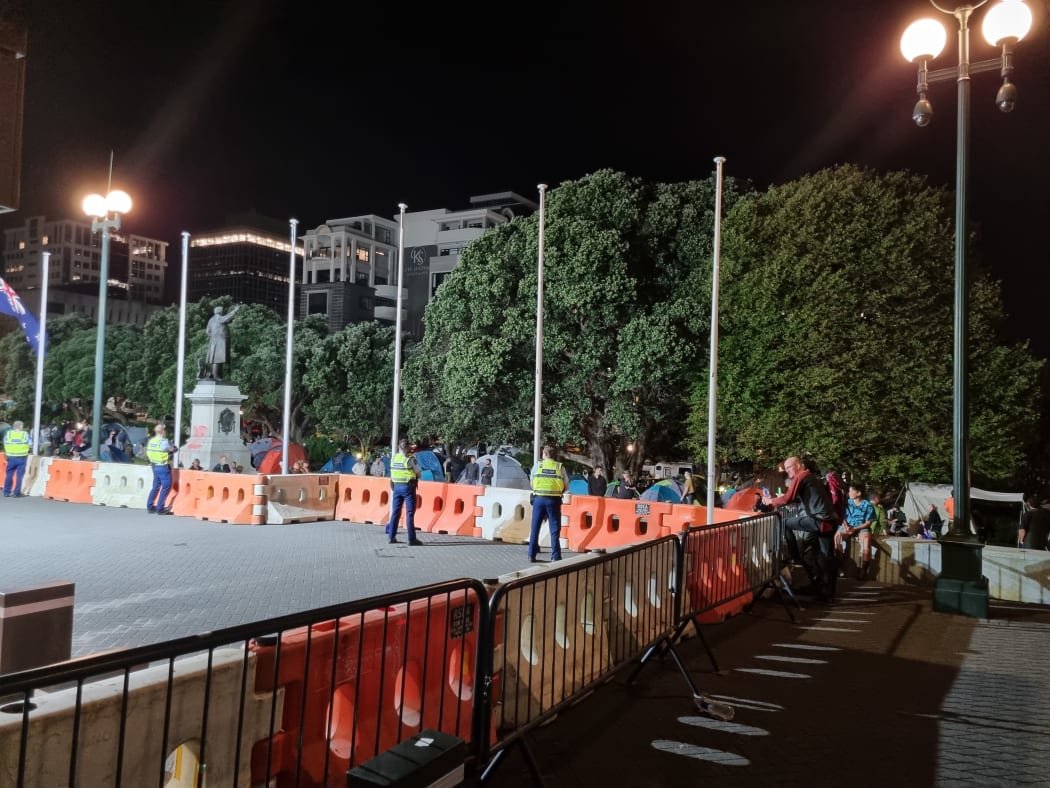
Photo: RNZ
After all that the Speaker Trevor Mallard gave a very practical insight behind the scenes, having often slept over at Parliament during the occupation. And slept is likely a poor choice of verb.
“I’ve spoken with [police] often at midnight, at three in the morning, and at six in the morning — it's not a great place to sleep here on occasions — and I've seen how hard they've worked.
“I want to also acknowledge our Copperfields staff, who have been here until half past 12 in the morning and been back at six in order to support with warm drinks the police, who were on occasions quite tired, quite cold, and quite wet, and I think that was great, too,” he said.
“There were a lot of rank and file police, and some very new ones. As we've said, I think two of the leaders may have spoken to the same young woman, but remember there were 79 others with exactly the same level of experience who came in here on Tuesday. We had for a long time and right through it some very experienced sergeants and senior constables. I think that they did a lot in defusing and handling the situation really well, and I just want to say how much I appreciate them, and they did come from all over the country.”
“Members, I just want to reiterate my thanks to our security staff here. They have worked enormously long hours — double shifts — and some of them seem to have aged. They haven't quite caught up with me, but they look considerably older. Their professionalism has been absolutely superb, and I want to thank them for that.”
The motion of thanks was agreed. That done the MPs packed up for the week, due to return in person (or virtually) next Tuesday.
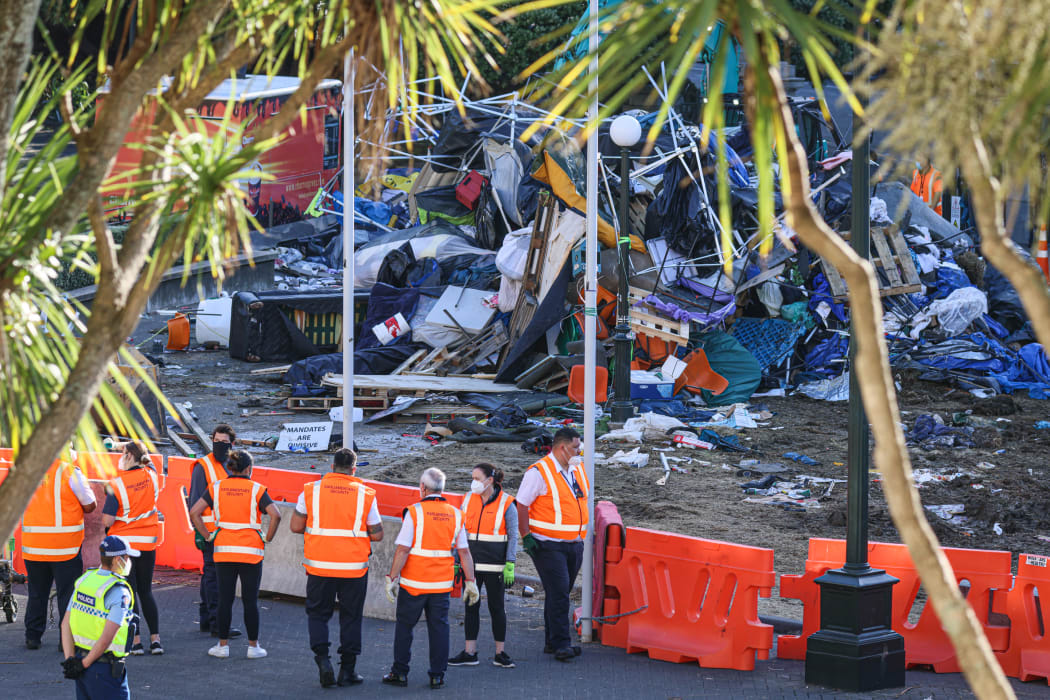
Parliamentary Security survey part of the rubbish dump where Parliament's lawn used to be. Photo: VNP / Phil Smith


